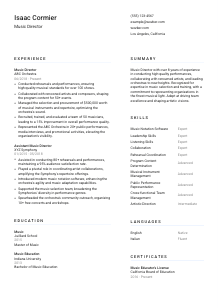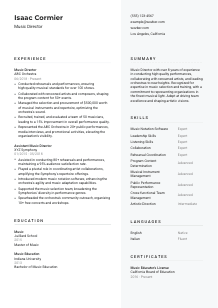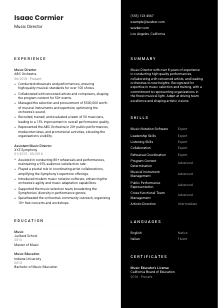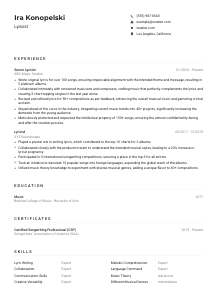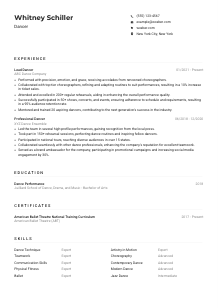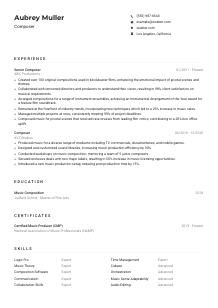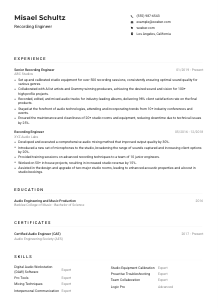Music Director Resume Example
Orchestrating harmonies, but your resume seems out of rhythm? Tune in to this Music Director resume example, composed using Wozber free resume builder. Discover how you can melodically blend your baton skills with job expectations, conducting a career crescendo that hits all the right notes!
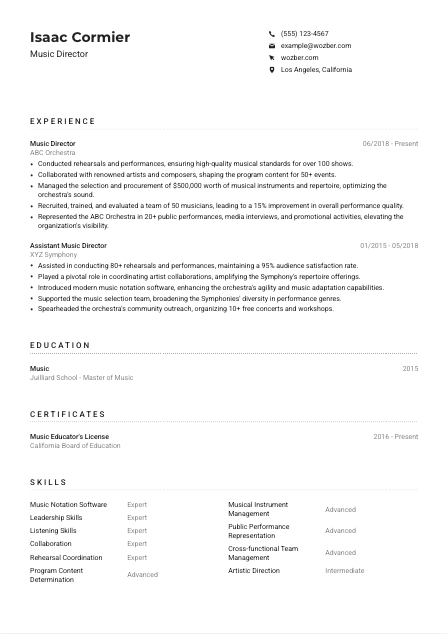
How to write a Music Director Resume?
Hello, aspiring Music Director! Crafting a resume that sings to the hearts of hiring managers is an art form in itself. With a conductor's baton in hand, you're ready to compose a resume that is a symphony of your professional journey. Using Wozber's free resume builder, we'll guide you through creating an ATS-compliant resume that harmonizes perfectly with your goal. Let's create a masterpiece that gets you on the podium!
Personal Details
First impressions in the musical world are everything, and your resume's Personal Details section is the prelude. Let's meticulously align your introduction with the rhythm of the Music Director position. Remember, this isn't just about stating your name; it's about setting the stage.
1. Your Name as Your Brand
Imagine your name in lights at Carnegie Hall. On your resume, your name should hold the same allure. Consider a typeface that's both elegant and readable, ensuring it commands attention.
2. Include Your Conductor's Batton aka Job Title
Directly beneath your name, specify that you are applying for the Music Director role. This acts as your baton, unmistakably conveying your intended position.
3. Essential Contact Details
Ensure your contact information is seamless to interpret. Include a professional email (firstname.lastname is timeless) and verify your number's accuracy. Like perfect pitch, precision in these details is key.
4. The Stage you Command: Your Location
"Must be located in or willing to relocate to Los Angeles, CA" - reflect this in your personal details to strike a chord with local opportunities and show you are in harmony with geographic requirements.
5. An Encore: Professional Profile Link
Consider including a LinkedIn profile or a personal website showcasing your portfolio. It's like an encore, providing more for those who want to delve deeper into your professional symphony.
Takeaway
Your Personal Details section sets the tone for your resume, serving as the opening act to your professional narrative. Ensure it is finely tuned and ready to captivate from the first note.





Experience
Your experience is your repertoire, a collection of performances that demonstrate your proficiency and passion. Let's orchestrate this section to resonate with the essence of a Music Director.
- Conducted rehearsals and performances, ensuring high‑quality musical standards for over 100 shows.
- Collaborated with renowned artists and composers, shaping the program content for 50+ events.
- Managed the selection and procurement of $500,000 worth of musical instruments and repertoire, optimizing the orchestra's sound.
- Recruited, trained, and evaluated a team of 50 musicians, leading to a 15% improvement in overall performance quality.
- Represented the ABC Orchestra in 20+ public performances, media interviews, and promotional activities, elevating the organization's visibility.
- Assisted in conducting 80+ rehearsals and performances, maintaining a 95% audience satisfaction rate.
- Played a pivotal role in coordinating artist collaborations, amplifying the Symphony's repertoire offerings.
- Introduced modern music notation software, enhancing the orchestra's agility and music adaptation capabilities.
- Supported the music selection team, broadening the Symphonies' diversity in performance genres.
- Spearheaded the orchestra's community outreach, organizing 10+ free concerts and workshops.
1. Understand the Composition
Analyze the job description as you would a score. Note the key responsibilities and experiences required, such as "Conducted rehearsals and performances, ensuring high‑quality musical standards."
2. Arrange Your Performances
List your engagements in order, leading with your most recent. Each position should detail the organization, your title, and the dates of your tenure, like movements in a concerto.
3. Crescendo: Achievement Highlights
Detail your achievements that mirror the job specifications. Use actionable verbs and quantify your impact, like "Managed the selection and procurement of $500,000 worth of musical instruments."
4. Measure Your Impact
Quantification makes your achievements sing. Whenever possible, include figures that demonstrate the scale and impact of your work, adding weight to your contributions.
5. The Finest Selections
Filter your experiences to showcase those most relevant to a Music Director role. Prioritize leadership, collaboration, and high-stakes performances to highlight your directorial prowess.
Takeaway
The Experience section is your stage. Each bullet point is a performance, showcasing your ability to lead, innovate, and excel as a Music Director. Craft it with the care of a maestro selecting their program.
Education
In the auditorium of your resume, the Education section seats proudly, echoing your academic foundation. For a Music Director, this isn't just background music; it's a vital part of the composition.
1. Highlight the Main Performances
"Bachelor's degree in Music, Music Education, or a related field" - align your academic credentials with this requirement, ensuring your qualifications are in tune with what's asked.
2. A Clear Composition
Organize your education history succinctly: degree, focus, institution, graduation year. Keep the structure simple, allowing the content to sing.
3. The Solo Parts: Degree Details
"Bachelor of Music Education in Music Education" - Tailor your degree presentation to match the job criteria, ensuring your educational background harmonizes with the role's requirements.
4. An Overture to Additional Learning
While the main degree is paramount, don't shy away from highlighting relevant coursework, especially if it adds depth to your qualifications as a Music Director.
5. Accolades and Ensembles
If you've graduated with honors or been part of influential music societies, mention these. Although more subtle, they add complexity and richness to your educational narrative.
Takeaway
Craft your Education section as a testament to your academic and musical foundation. It's a crucial movement in the symphony of your resume, underscoring your readiness for the conductor's podium.
Certificates
Certificates in the Music Director resume sing arias of continuous learning and specialization. Curated properly, they spotlight your dedication beyond the basic requirements.
1. Encore Performances
Identify certifications like the "Music Educator's License" that resonate with the job posting's wish list. These underscore your commitment and compliance with industry standards.
2. The Chosen Highlights
Select certifications that reinforce your candidacy for the Music Director role. These are your legatos, smoothly connecting your experience with your potential.
3. Timely Annotations
For certificates with expiry dates or those recently acquired, include these dates to demonstrate your contemporaneity and proactive stance on professional development.
4. The Key Change
In the ever-evolving world of music and education, pursue ongoing certifications and courses to keep your skills not just relevant but revolutionary. Aim to be a pioneer in your field.
Takeaway
Certificates are the embellishments in the composition of your resume, striking the high notes of your continuous learning and professional mastery. When chosen wisely, they elevate your presentation, marking you as an ideal candidate.
Skills
In the grand composition that is your Music Director resume, the Skills section is the harmony that binds the melody. Let's ensure your skills are perfectly pitched to resonate with the role.
1. Composing Your Skill Set
Carefully review the job description to discern both explicit and implicit skill requirements. Skills like "Music Notation Software" and "Strong Leadership Skills" are keynotes in your symphonic resume.
2. Harmonizing Skills with Requirements
List skills directly tied to the job description, prioritizing those that show your mastery and versatility as a Music Director. Think of each skill as an instrument in your orchestra, essential for the full performance.
3. Ensuring a Balanced Ensemble
While it might be tempting to showcase your entire repertoire, focus on those skills that create a harmonious profile for a Music Director. Quality over quantity will make your resume sing to hiring managers.
Takeaway
Your skills section is more than a list; it's an ensemble of your professional abilities. Chosen carefully and presented elegantly, it amplifies your suitability for the Music Director role, ensuring your resume performs as masterfully as you do.
Languages
In the diverse and vibrant world of music, language skills can open doors to global stages. Whether directing international ensembles or understanding the nuances of non-English compositions, your linguistic abilities enrich your profile.
1. Scoring the Part
While "Proficient English speaking and listening skills" are a must, any additional languages can distinguish you, especially in roles that involve international collaboration.
2. Highlighting Your Linguistic Repertoire
Place a strong emphasis on English proficiency, then list any other languages you speak. Even if not a direct requirement, they show your capability to engage with diverse musical traditions.
3. Arranging Your Languages
List your languages in order of proficiency. This gives clarity to the reader and shows respect for the nuances of linguistic skills.
4. The Dynamics of Proficiency
Be honest about your language levels. Misrepresenting your fluency can lead to off-key moments when communication is key.
5. The Global Stage
Consider how each language you know might play a part in your role as a Music Director. Even basic proficiency can facilitate connections in the global music scene.
Takeaway
Music might be the universal language, but your ability to communicate in multiple languages can significantly broaden your reach and influence. View each language you know as a key to unlocking new horizons.
Summary
Your Summary is the solo at the beginning of the concert that sets the stage for everything to come. It's a powerful, succinct piece that encapsulates your essence as a Music Director.
1. Tuning Your Instrument
Reflect on the role and its requirements. This is your moment to tune your summary to the key of the position.
2. The Opening Note
Start with a statement that resonates, such as: "Music Director with over 8 years of experience." This immediately sets the tone of your expertise and passion.
3. Developing the Theme
Incorporate skills and accomplishments that directly correspond to the job requirements. This is your performance, showcasing why you're the maestro for the job.
4. Crafting a Masterpiece
Keep this section concise yet impactful. Aim for a few lines that encapsulate your professional identity, much like a well-crafted motif that recurs throughout a symphony.
Takeaway
Your summary is the initial theme that captures the audience's attention. It hints at the symphony to follow and entices the hiring manager to dive deeper into the narrative of your resume. Make it compelling, clear, and reflective of your professional journey.
Taking the Podium
Congratulations, maestro! With these guidelines, your Music Director resume is now a symphony of skills, experiences, and accomplishments, ready to enchant hiring managers. Remember, the key to a standing ovation is to tailor your resume with the precision of a conductor's baton, making every note, every word, count. Wozber's free resume builder, ATS-friendly resume templates, and ATS resume scanner are here to ensure your resume hits all the right notes. Let your career crescendo begin!

- Bachelor's degree in Music, Music Education, or a related field.
- Minimum of 5 years of experience in conducting or musical direction.
- Proficient in using music notation software and related technology.
- Strong leadership skills and the ability to collaborate with diverse teams.
- Possession or ability to obtain appropriate state teaching certification or music director license, if applicable.
- Proficient English speaking and listening skills necessary.
- Must be located in or willing to relocate to Los Angeles, CA.
- Conduct rehearsals and performances, ensuring high-quality musical standards.
- Collaborate with artists, composers, and other stakeholders to determine program content and artistic direction.
- Manage and coordinate the selection and procurement of musical instruments and/or repertoire.
- Recruit, train, and evaluate members of the musical team.
- Represent the organization in public performances, media interviews, and other promotional activities.





